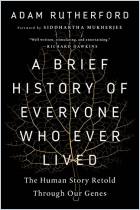Rejoignez getAbstract pour lire le résumé !

Rejoignez getAbstract pour lire le résumé !
Philipp D. Koellinger and K. Paige Harden
Using Nature to Understand Nurture
Genetic associations show how parenting matters for children’s education
Science, 2018
Aperçu
The idea of genetic nurture claims that even a parent’s genes that a child doesn’t inherit impacts the child.
Recommendation
Genetic nurture upends the idea that nature and nurture exert distinct and separable influences on human beings. A new analysis of data from genome-wide association studies found that the genes a parent does not pass on to a child still affect the child’s education. Because these genes affect the child’s parents, siblings and other relatives, they impact the environment that the parent and child jointly inhabit. This environment in turn affects the child’s level of education. getAbstract recommends this article to anyone concerned with the consequential dynamic of nature and nurture.
Summary
About the Authors
Philipp D. Koellinger is a professor in geno-economics at the Vrije Universiteit Amsterdam. His research focuses on how genes influence economic behavior. K. Paige Harden is an associate professor of psychology at The University of Texas at Austin, where she runs the Developmental Behavior Genetics Lab.


















Comment on this summary